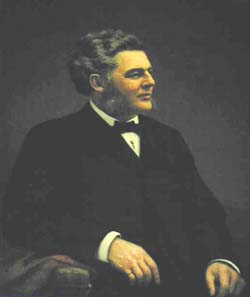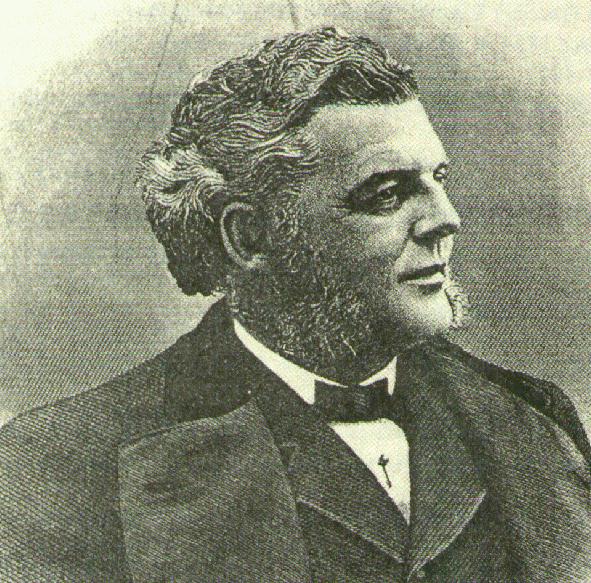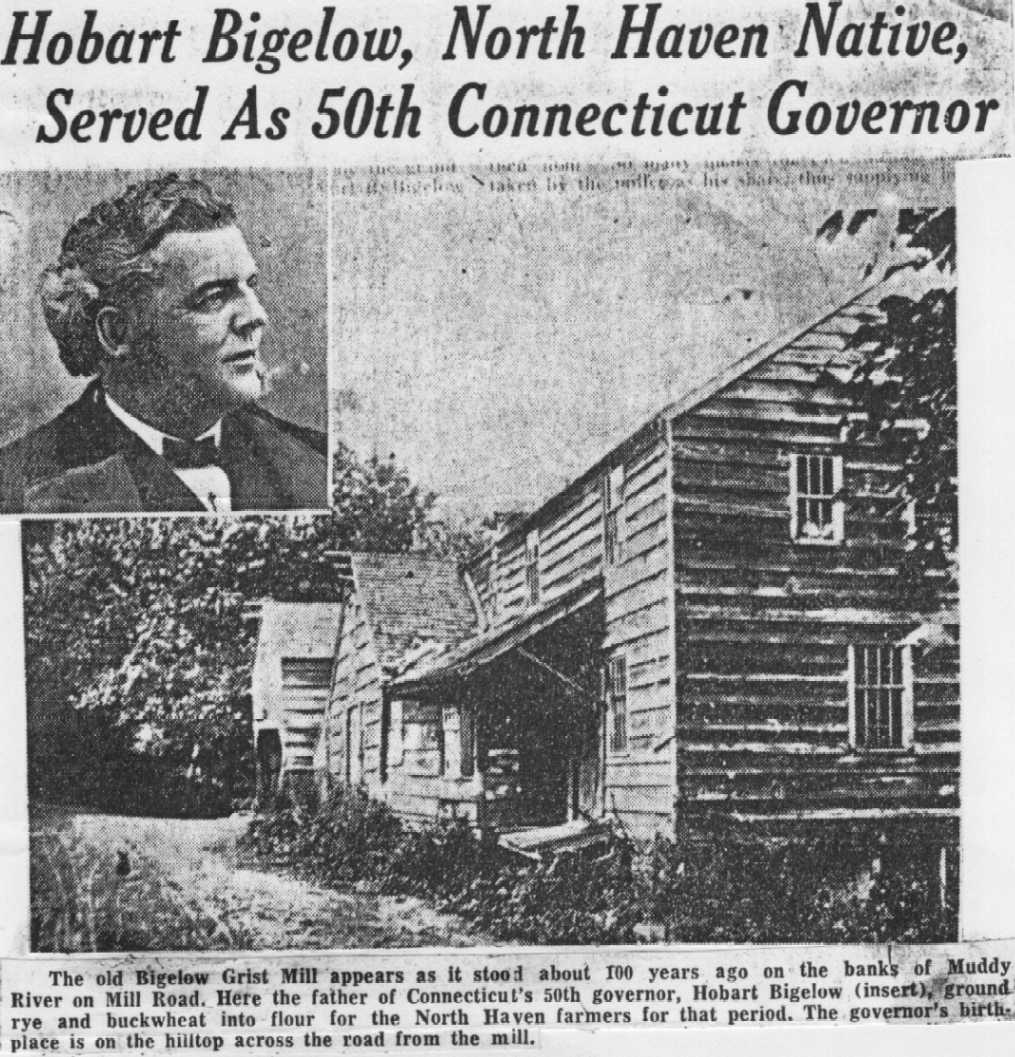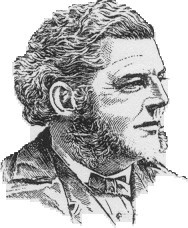

Children of Hobart and Eleanor (Lewis) Bigelow:
15336.8341 Frank Lewis, b 21 Sept 1862; d _____ ; became Secretary. of Bigelow Co. (see below)
15336.8342 Eleanor Mary, b 26 Aug 1864.
15336.8343 Walter Pierpont, b 13 Nov 1866.
15336.8344 Philo Lewis, b Sept 1871; d 29 Sept 1871, age 2 weeks according to headstone.
Sources:
Bigelow Society,The Bigelow Family Genealogy, Vol II, pg
371-372;
Howe, Bigelow Family of America;
headstone readings;
Bigelow Society records.
Illustrated Popular Biography of CT, 1891; page 165-166: (see below)
Forge: The Bigelow Society Quarterly; Vol 15, No 3, pg 56;
July
1986.(see below)
Note:
Subject: Hobart B. Bigelow
Date: Wed, 29 Nov 2000 11:01:57 -0500
From: "James Fregau" <
bigelowco@cshore.com >
Organization: The BIGELOW CO
We are interested in obtaining more information on Hobart
Bigelow.
Thank you. Best Regards
Jim Fregeau
The Bigelow Company
Phone 203-245-3838 or 203-245-3840
email: bigelowco@cshore.com
Fax 203-245-9797
_____________________________________________________________
Subject: Hobart B. Bigelow
Date: 08 Mar 2004
From: "Jean A Eichhorn"
< jean0305@comcast.net >
I am researching my father's family. I am the only chick
from
a second marriage. Although I knew some of the family, we lived
in
Maine
and they all lived in and around New Haven ... a long trip in
the 50's.
In my grandfather's obituary, it says he was "... affiliated
with the
Bigelow Company for over 50 years". I know, from my half sister
who
actually knew him, that it was Bigelow Manufacturing. I have
seen him
referred to as a "secretary" but the wording always makes me
thing that
it was more like what we would call a Vice President in charge
of "X".
More:
Thanks ! That site is how I found your email.
Grandpa
Horton
is called a "purchasing agent" on one census. My Dad used
to talk
about going into the plant with his father and learning basic
blacksmithing
skills in the foundry ... I am pretty sure it is the same
company
also.
Are there any public libraries in New Haven which might have old
employee
lists; or any City departments ? My guess is that he never
was
under
Social Security, so that is a dead end. Plus, they only have
records on
the people whose relatives actually tell them the person has
died ...
boggles the mind, does it not ? Jean


Hobart B. Bigelow, was born 16 May
1834 in the farmhouse adjacent to his father's mill, shown
above.
The Bigelows
bought the mill early in the 1800's, and here ground wheat, corn,
rye,
and
buckwheat in the mill until they sold in 1844 and moved to South
Egremont,
MA.
In 1851 Hobart was apprenticed to a
machinist,
then
went to work later at New Haven Manufacturing, where an uncle was
foreman.
Later Hobart formed Bigelow Manufacturing Company, making boilers
and
machine
parts. In time the company became one of the largest
concerns of
its
kind in the East.
Hobart Bigelow served New Haven, CT as
councilman and alderman, as fire commissioner and state
legislator, and
mayor of New Haven. From 1881 to 1883 he was governor of
Connecticut, and from 1882
until his death, he was president of Merchants National
Bank. He
died
12 Oct 1891. In 1857 he had married Eleanor Lewis. The
had
three
sons and a daughter, one son dying in infancy. His wife died
26
May
1912.

Hobart B. Bigelow, one of New Haven's
citizens who has been entrusted with the administration of the
highest
public office within the gift of the state, was born in North
Haven,
New Haven county, on
the 16th of May, 1834. Upon his father's side he came from the
Massachusetts Bigelow stock, a family that has made its record
since
colonial days for producing
substantial, energetic, and useful citizens. His mother was a
Pierpont,
a
descendant of the Rev. James Pierpont, the second minister
of New
Haven,
and one of the founders of Yale College. Mr. Bigelow's education
was
that
common to the sons of farmers at that time. He attended the
district
school
of North Haven, and when, at about the age of ten, his father
moved to
South
Egremont, Mass., his education was continued there, in the same
class
of
school, until he was old enough to enter the South Academy, where
he
remained
until he was seventeen.
At this age he entered upon the work of
life.
He
began to learn the trade of machinist with the Guilford
Manufacturing
Company,
remaining
with the company until its failure, after which he went into the
employ
of
the New Haven Manufacturing Company, then under the management of
his
uncle,
Asahel Pierpont of New Haven, where his apprentaship was finished.
After
this, and until 1861,
had charge of the machine department of Mssrs. Ives and Smith as
foreman, under both Ives and & Smith and their successors,
Wilcox
& Gay. In
1861, upon the death of Mr. Gay, he bought Mr. Cyrian Wilcox's
interest
in
the machine-shop and continued in his own name. Later he acquired
of Mr. Wilcox the foundry connected with the establishment
and
the business was
carried on under the name of the Bigelow Manufacturing Company. At
this
place,
under close, careful, and intelligent management, Mr. Bigelow's
business
grew until there was no longer space for his buildings. They had
extended
along Whitney avenue and through the block to Temple street, and
in
1870
he was compelled to remove to a wider location. He bought a tract
of
land
on Grapevine Point, including a disused building originally built
for a
machine-shop,
and in this place the business has since been conducted.
Two years prior to his removal Mr.
Bigelow had
added
a department for the manufacture of boilers, a department for
which his
establishment
has since become famous throughout the country. In 1875 the firm
style
was
made H. B. Bigelo\v & Co. , Henry Elson being received as
partner,
and
in 1877 the partnership was extended by the entrance of Mr. George
S.
Barnum.
Its present form is that of a corporation, The Bigelow Company,
organized
in 1883 under a special charter granted by the legislature of that
year.
Mr. Bigelow's continuous success in his
business had not passed unnoticed by his fellow-citizens, and in
the
period between 1863 and 1881 he was called upon to fill a variety
of
public stations. He
was a member of the common council, as councilman in the year
1863-64,
and
as alderman 1864-65, under the mayoralty of the late Morris Tyler.
He
was
supervisor 1871-74, and filled most acceptably the office of fire
commissioner
for the years 1871-76. He also served one term as representative
from
New
Haven in the general assembly of 1875. So long an experience had
especially
fitted him to fill the place of mayor, and though belonging to the
party
normally in the minority in New Haven, he was, in 1879, elected
for a
two-years
term by a very handsome majority. Mr. Bigelow's administration of
this
office
was marked by two events of peculiar and permanent interest to the
citizens
of New Haven. It was under his administration, and very largely
due to
his
support and encouragement, that the East Rock Park Commission was
created
and the park opened, and this great addition to the beauty and
comfort
of
the city made possible. The other was the well planned and
successful
effort
of the city government under his encouragement and direction for
the
building
of the breakwaters which have been projected and are being carried
on
by
the United States Government for the improvement of our harbor.
Upon
the
close of his term as mayor, he was called by the majority of the
citizens
of the state to occupy the office of governor, a place which he
fillcd
with
quiet dignity, thorough impartiality, and great good sense.
Mr. Bigelow was married in 1857 to Miss
Eleanor Lewis,
daughter of the late Philo Lewis, a branch of a family that has
left
its
mark in the administration of New Haven city affairs. His family
consists
of two sons, both of whom are associated with him in business.
In 1882, upon the death of Nathan Peck,
he was
elected
president. of the Merchant's National Bank of New Haven, and
retained
that
position until the fall of 1889, when he resigned - but still
retains
the
position of director.
Since Governor Bigelow's retirement from
official life, his attention has been devoted to his company, with
lesser interest in a large variety of business enterprises. His
career
has been pre-eminently that of a business man, familiar with and
skillful in modern methods of conducting
large enterprises, and basing his success upon thoroughness,
energy,
careful
and thoughtful attention to details, avoidance of speculatIon, and
the
severest
integrity. His administration of public affairs has been marked by
the
same
characteristics. These qualities have won him the hearty esteem of
his
fellow-citizens,
,which has been deepened by a quiet, open-handed, and broad-minded
practical
benevolence, of which very few realize the full extent.
Best regards,
Richard Smith
GREYHAVENS BOOKS
Soquel, CA
EVENING POST ANNUAL, 1882
BIOGRAPHICAL SKETCHES
[With Portraits] of the State Officers, Representatives in
Congress, Governor’s Staff, and Senators and Members of
the General Assembly of the State of Connecticut.
Published Annually.
Hartford, Conn.: Evening Post Association. 1882.
Pages 9 - 11
GOVERNOR HOBART B. BIGELOW
Governor Hobart B. Bigelow, of New Haven, is a man from
the
people, and from earliest boyhood has shared their
instincts and sympathies. Through industry, perseverance,
and
force
of character, he has raised himself to a
commanding position in business and financial circles, and
enjoys a
record that any citizen of Connecticut might justly
feel proud of. He was born in North Haven, Conn., May 16,
1834,
and
lived there until he was ten years of age, when
his father, Levi L. Bigelow, removed to Great Barrington,
Mass.,
where
he was station agent on the Housatonic
railroad for three years. From there he went to South
Egremont,
Mass.,
where he entered into the manufacture of
pump-chains. He returned to North Haven about 1855, where
he
still
resides, thoroughly respected and esteemed by
his fellow townsmen. He has held the office of
tax-collector for
a
number of years, and has participated with credit in
the management of town affairs.
His mother, who is also living, was Miss Belinda Pierpont,
a
lineal
descendant of Rev. James Pierpont, the second
minister at New Haven, and one of the founders of Yale
college.
The
Connecticut poet, Rev. John Pierpont, well
known in the literary world, and the eminent jurist,
Edwards
Pierrepont,
have the same descent. Edwards Pierrepont
was born at North Haven, which was also Mrs. Bigelow’s
birthplace.
The Bigelows of Connecticut are connected with the
Massachusetts family of that name, and have been noted for
intellectual integrity, sound patriotism, and strict
observance
of
moral principle. The solid manhood of Colonel Thomas
Bigelow, of the Fifteenth Massachusetts regiment, and
efficient
Revolutionary
officer, has been characteristic of the
race. He commenced life as a blacksmith, and, like General
Greene of
Rhode Island, won his way to a position of
honor and responsibility. He marched to Cambridge at the
head of
a
company of minute-men after hearing of the battle
of Lexington; assisted at the capture of Burgoyne, and was
at
West
Point and Valley Forge.
With the blood of the Pierponts and Bigelows in his veins,
nothing less than success could have been expected when
Governor Bigelow commenced at Guilford the carving of his
own
fortune
in the world. He had enjoyed what facilities
the common schools of his native town afforded, but had
completed his
education at the academy in South Egremont,
and at the age of seventeen he was apprenticed to the
machinist
trade,
entering the works of the Guilford
Manufacturing Company, of which William Faulkner was
president.
On
the failure of the Guilford company eight
months afterwards, he removed to New Haven, and completed
his
apprenticeship
in the New Haven Manufacturing
Company’s works.
His uncle, Asahel Pierpont, was president of the company,
and
was
also the founder of the extensive business now
carried on by Mallory, Wheeler & Co., one of the
largest
lock-manufacturing
concerns in the county. His uncle’s
influence helped in shaping his business career, and
inspired
him
with self-reliance.
At the expiration of two years, his trade having been
completed, he entered the employ of the old firm of Ives &
Smith,
which afterwards passed into the hands of Wilcox & Gay.
Governor
Bigelow held the position of foreman in both
concerns.
On the death of Mr. Gay, in 1861, through the kindness of
friends Governor Bigelow was enabled to purchase the
machine department, Mr. Cyprian Wilcox, of the old firm,
retaining the foundry. Three or four years later he also
purchased the foundry, and carried on the business of both
departments, increasing his works and enlarging his sphere
of activity every year. In 1870 he transferred the entire
concern to
Grapevine Point, and added to the machine
department the manufacture of boilers, having already
established himself
to a considerable extent in the latter industry.
At present, the Bigelow Boiler Works stand among the
foremost in
the
State.
Seven years ago Governor Bigelow associated Henry Elson,
formerly his superintendent, with him in business. In
October, 1879, George S. Barnum, who had been a clerk in
the
establishment,
was also taken into partnership. The
works are now controlled by H. B. Bigelow & Co., and
constitute an active industrial center.
In 1861 Governor Bigelow received a government contract
for
300,000 “gun parts” for the Springfield rifle, requiring
three years in its execution. The contract gave employment
for a
large
corps of hands, and was carried out successfully
and to the satisfaction of the government. For several
years
Governor
Bigelow has been a director in the Merchants’
National Bank of New Haven, one of the largest institutions
in
the
State, and on the death of Nathan Peck, in January,
1882, he was elected its president. By virtue of his office
as
mayor
of New Haven he was also, until January 1, 1881, a
director in the Derby Railroad.
He served one year each in the offices of councilman and
alderman of New Haven, the late Morris Tyler being mayor
at that time. In the spring of 1875 he was elected a member
of
the
House from New Haven, his majority being 1,638.
The election showed his splendid personal popularity in the
city.
During the session he was a member of the Committee
on Banks, and was a hard and diligent worker in that
capacity.
His
views on financial questions were always sound,
and his judgment was decisive with his colleagues.
Throughout,
his
career in the legislature was highly honorable, both
as a citizen and legislator.
In December, 1878, he was elected mayor of New Haven by a
majority of 2,378. This magnificent triumph was due in
part to disaffection in the Democratic ranks, numbers of
the
opposition
party voting for him instead of their regular
candidate. But it is beyond question that Governor Bigelow
was
the
most popular Republican in New Haven, and
polled a larger vote than any one else could have done. His
administration
as mayor was conservative, prudent, and
economical, and met with universal public approval. The
city was
ably
governed, Mr. Bigelow attending to his public
duties with the same fidelity with which he controls his
private
matters.
As President Watrous, of the New York, New
Haven, and Hartford road remarked, when presenting his name
before
the Republican State Convention in 1880, his
eminent success in the management of his own interests
demonstrated his fitness for any trust to which he might be
called by the suffrages of his fellow citizens.
As chief executive of the State, Governor Bigelow has won
the
heartiest
approval of the public, and his administration
has commanded complete confidence.
Governor Bigelow is a member of the Church of the Redeemer
at
New
Haven, Rev. Dr. John E. Todd’s, and is a
broad and liberal Christian gentleman. while his life has
been
one
of brilliant business success, it has also been
characterized by conscientious religious convictions,
benevolent
aims
and purposes, and untarnished personal honor.
He resides on Orange street, in one of the most attractive
portions of New Haven. His family consists of a wife and
two sons, and occupies a high social standing in the
community.
His
oldest son, Frank L. Bigelow, graduated from the
Yale Scientific School last summer, and holds the position
of
aide-de-camp
on his father’s staff. The remaining son,
Walter P. Bigelow, is pursuing a liberal course of studies
at
New
Haven.

